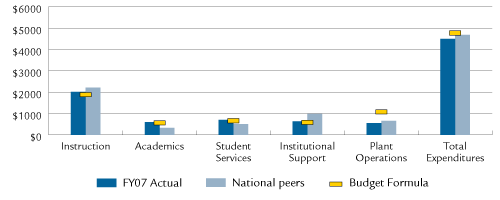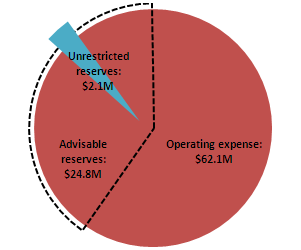Middlesex Community College
Middlesex Community College (MCC) is a progressive and dynamic learning community, committed to providing educational programs and services that support personal growth and economic opportunity for its diverse student population. Dedicated to student success, the College provides excellence in teaching, personal attention, and extensive opportunities for exploration and growth.
Program of Distinction
Collaborations
Access Indicators
Affordability Indicators
Student Success and Academic Quality Indicators
Fiscal Effectiveness and Efficiency Indicators
Program of Distinction
Since its inception in 1992, service learning has become part of the MCC culture. Over the past five years, 2,455 students have performed 53,934 service hours-conservatively valued at $431,472-as part of their coursework. In recognition of its national leadership position, MCC has been named to the Presidents' Higher Education Community Service Honor Roll, designated as a Civically Engaged Campus by the Carnegie Foundation and included on the Savior to our Cities list by the New England Board of Higher Education.
In 2007-08, MCC expanded its commitment to civic responsibility through the planning and implementation of a college-wide Day of Service. On October 18, 2008, more than 800 students, faculty and staff volunteered 2,400 hours of service valued at over $40,000 at 55 sites in 16 cities and towns. The service provided focused on a wide variety of issues including homelessness, hunger, animal care, literacy, elder care, youth services and environmental cleanup and restoration.
Collaborations
- The Vertical Math Teaming Initiative improves students' success in math as they move through the Lowell Public School system to MCC and UMass Lowell. In 2007- 2008, faculty built on their previous success by producing a Math Dictionary to ensure the consistent use of math vocabulary; offered math skill refresher workshops to students entering high school and assessed the basic arithmetic and algebra skills of Lowell High students who placed into a developmental math course at MCC.
- The success of the Vertical Math Team led to the formation of Chemistry and English Vertical Teams by the Lowell Public School System, MCC and UMass Lowell faculty. In FY08, the Vertical Chemistry Team compared lab facilities, lab experiments and assignments, syllabi, text books and assessments, and reviewed course sequencing. The English Vertical Team examined the writing curriculum at each level, shared assessment rubrics and held a workshop to discuss effective teaching strategies.
- The Lowell Small Business Assistance Center (LSBAC) supports entrepreneurs seeking to start a small business by helping them complete a feasibility study, develop a business plan, apply for a loan and learn about business management, financing and technology. Over the past five years, LSBAC has served 1,592 clients who started 206 businesses and created 252 jobs. The LSBAC is cosponsored by MCC, UMass Lowell, The City of Lowell and Community Teamwork, Inc.
- Opportunities to engage in hands-on science projects and an active recruitment program have resulted in a 20% increase in Science, Technology, Engineering, and Math (STEM) majors at Middlesex since 2006. The most significant growth is in the areas of Life Science (73%), Engineering Science (45%) and Computer Software/Networking Technology (39%). The College has been particularly successful at attracting minority students - 41% of the 813 students enrolled in STEM majors in 2008 are racial or ethnic minorities. In FY08, 100 students participated in out-of-class science projects in areas such as nanotechnology, biotechnology, chemistry, renewable energy, ecology, video gaming and information technology. Middlesex collaborated with the UMass Boston and Lowell and Northeastern University to achieve these results.
- In 2007-208, 160 high school drop-outs enrolled in the MCC Out of School Youth (OSY) program that provides GED instruction, career assessment, employment skills workshops and access to post-secondary education. One hundred ten OSY students earned their GED in 2008 and 21 participated in Pathways, which allows students to enroll in two developmental courses at MCC. The Pathways program is available at no cost to students and provides case management services, books and materials, bus passes and, upon successful completion, a stipend. These programs are supported by the City of Lowell, the Greater Lowell Workforce Investment Board, the Bilezikian Foundation and the Mark and Eliza Saab Family Fund.
- The MCC Celebrity Forum is a community enrichment program supported by corporate and individual sponsorships to build the college endowment and raise money for scholarships. Over 17, 500 community residents have attended forum events featuring persons of historic and significant renown including President George H. W. Bush and Barbara Bush, Walter Cronkite, Colin Powell, Rudy Guiliani, Jay Leno and the late Tim Russert. The Celebrity Forum Scholarship program has awarded $65,000 to Middlesex students since 2004.
Section I: Access to Public Higher Education in Massachusetts
Access Indicators
Fall 2007 Enrollment
| Headcount |
8,124 |
| FTE |
4,869 |
Fall Enrollment
Over the last three years, fall headcount enrollment has remained relatively stable.
Over the last three years, fall full-time equivalent (FTE) enrollment has remained relatively stable.
Annual 2007–2008 Enrollment
| Headcount |
11,456 |
| FTE |
5,025 |
Annual Enrollment
Over the last three years, annual headcount enrollment has increased 2.1%.
Over the last three years, annual FTE enrollment has increased 2.6%.
Looking Back: Fall and Annual Headcount Enrollment

Fall 2007 Minority Enrollment
26.8%
Minority Enrollment
Greater than the minority representation of the institution's primary draw cities and towns (17.3%) and the Southeast Region's minority representation of 14.5%.
Section II: Affordability of Massachusetts Community Colleges
Affordability Indicator
2007–2008 Tuition and Fees as a Percent of Median Family Income
4.9%
% of Median Family Income
Comparable to the Northeast regional average of 4.9%.
Looking Back: Tuition and Fees as a Percent of Median Family Income
|
FY2004 |
FY2005 |
FY2006 |
FY2007 |
FY2008 |
| Middlesex Community College Tuition and Fees |
$3,380 |
$3,650 |
$3,650 |
$3,740 |
$3,860 |
| State Median Family Income |
$67,527 |
$68,701 |
$71,655 |
$74,463 |
$78,497 |
| "X" as a Percent of State Median Family Income |
| X = Middlesex Community College Tuition and Fees |
5.0% |
5.3% |
5.1% |
5.0% |
4.9% |
| X = Massachusetts Community Colleges' Average Tuition and Fees |
4.8% |
4.9% |
4.9% |
4.7% |
4.7% |
| X = Northeast Average Tuition and Fees |
|
4.8% |
4.8% |
4.9% |
4.9% |
Section III: Student Success and Academic Quality
Success and Quality Indicators
Fall 2006 Cohort First-Year Persistence Rate
| Retained at original institution |
54.4% |
| Retained at any institution |
65.0% |
Fall Cohort First-Year Persistence
Persistence at original institution has remained relatively stable over the last three years but is below the segmental average of 56.5%.
Looking Back: Fall-to-Fall First-Year Persistence Rate

Fall 2003 Cohort Four-Year Overall Success Rate
71.8%
Fall 2003 Cohort Four-Year Individual Success Rates
| Earned Degree/Certificate |
33.8% |
| Transferred |
18.3% |
| Earned 30 Credits |
17.9% |
| Still Enrolled |
1.8% |
| Note: Each subsequent category excludes any student included in previous category(ies) |
Fall Cohort Four-Year Overall Success Rate
This new indicator measures students who have earned a degree/certificate, transferred to another institution, earned 30 or more credits, or are still enrolled after four years. Future reports will include these outcomes over four, five, and six years for this and successive cohorts. Please see the Technical Guide for further details regarding this indicator.
2007–2008 Fall-to-Spring Retention Rate
89.2%
Fall-to-Spring Retention Rate
Fall-to-spring retention has remained relatively stable over the last three years.
FY2008 Credit Course Completion Rate
74.7%
Course Completion
Comparable to the Board of Higher Education's target rate of 75%.
Total Degrees Conferred in FY2008
973
Degrees Conferred
Average degrees conferred per year over the last three years: 980
Looking Back: Degrees Conferred

2007 Pass Rate on the National Nursing Licensure Examination
82.9%
Nursing Exam Pass Rate
Below the Board of Higher Education's target pass rate of 85%.
FY2008 Annual Enrollment in Workforce Development Courses
17,766
Workforce Development
Average annual enrollment in workforce development courses per year over the last three years: 18,068
Section IV: Effective and Efficient Use of Resources
Effectiveness and Efficiency Indicators
Effective Projects and Initiatives
- The College has implemented various sustainability projects and initiatives that have reduced the KWH/square foot by 18 percent over the last six years, resulting in over $500,000 in cost savings during that same period.
- MCC was one of only 13 colleges nationwide to receive one of the U.S. Department of Education's first-ever Emergency Preparedness grants to improve campus safety in the amount of $190,000. Under this grant, nearly 75 MCC personnel, working with community partners, will be trained in the National Incident Management System, a nationally recognized program for dealing with emergencies and crises.
- MCC received $400,000 a year for five years, through the U.S. Department of Education Title III project entitled Strategies for Success: Increasing Achievement, Persistence, Retention and Engagement.
Resource Allocation
Expenditures per Student—Actual, National Peers, and Budget Formula

Note: This graphic was revised on May 6, 2009. The previously posted graphic displayed the data inaccurately.
FY2008 Primary Reserve Ratio
| Unrestricted Reserves (UR) |
$2,109,521 |
| Total Operating Expenses (TOE) |
$62,104,470 |
| Primary Reserve Ratio (UR/TOE) |
3.4% |
Primary Reserve Ratio

Compliance
No materials weaknesses based on annual external independent audit:

